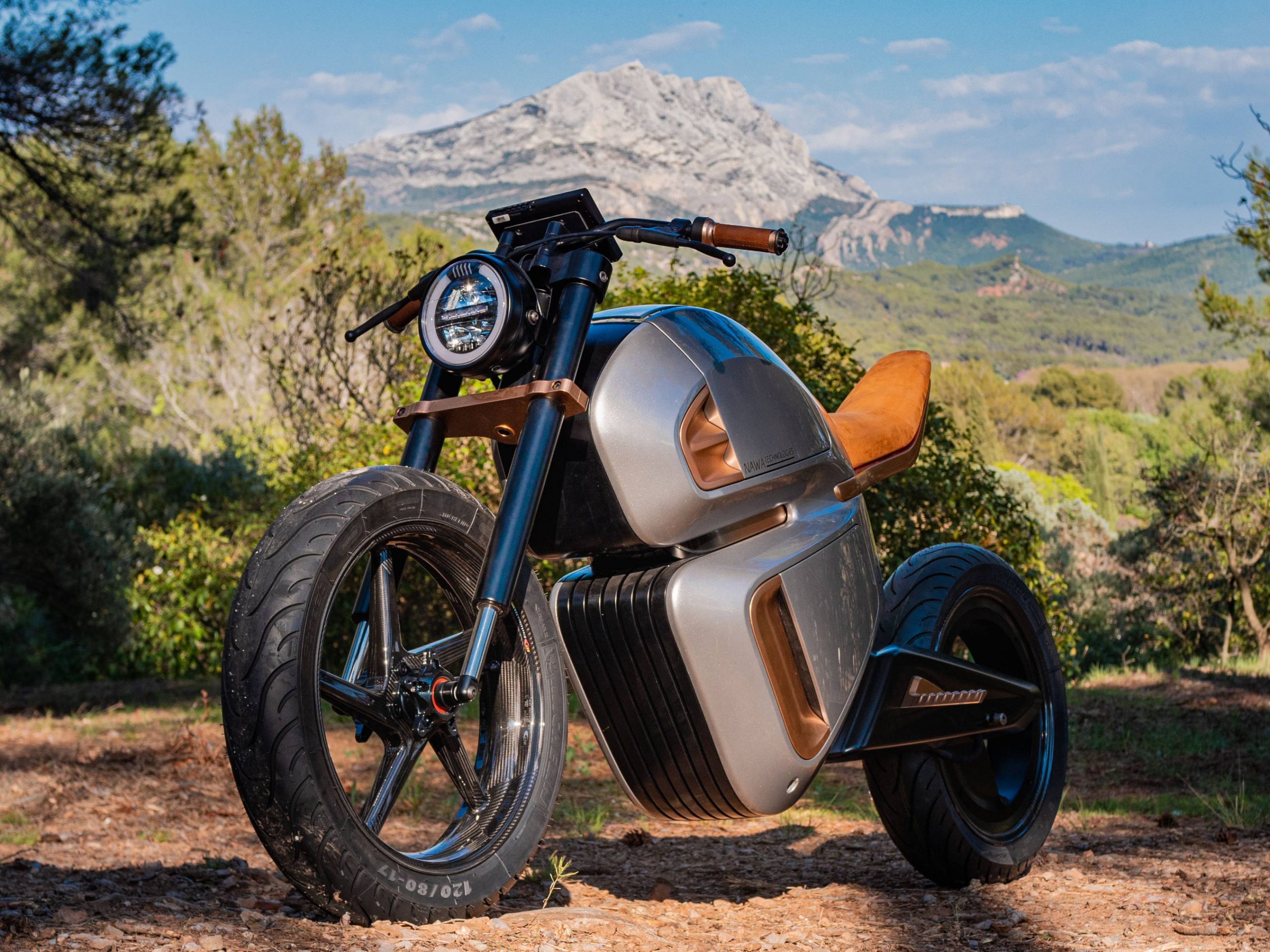
Our recent article regarding Ducati’s decision not to produce an electric motorcycle until battery technology further evolves brings us to the NAWA Racer pictured here. French company NAWA describes an electric motorcycle fed not only by a lithium battery, but a lithium battery hybrid that works in conjunction with proprietary “ultracapacitors”. These ultracapacitors (or supercapacitors?) are, according to NAWA, capable of substantially increasing the efficiency of a standard lithium battery system by, among other things, capturing more energy from regenerative braking. The ultracapacitors also maintain acceleration performance despite reduction in the charge level of the lithium battery.
Here is a portion of the press release from NAWA describing the NAWA Racer, followed by the company’s video:
About NAWA Racer
Intended to turn heads as well as offer a ground-breaking electric powertrain, NAWARacer brings a modern twist to its retro styling. Its top tank area hides an arrangement of NAWA Technologies’ own ultracapacitors, which boost a lithium-ion battery mounted low in the chassis with an innovative Hybrid Management system (HMS), Energy Control Unit (ECU) and in-wheel electrical motor.
Re-using more than 80 percent of the energy captured from regenerative braking, NAWARacer uses a much smaller lithium-ion battery than would otherwise be possible: around half the size of a conventional electric sports bike’s battery.
The NAWACap pack itself is lightweight and is combined with the motorbike’s aluminum structural body, set to offer a 25 percent weight saving over conventional electric sports bikes. The hybrid storage pack powers a highly efficient in-wheel electrical motor, developing up to 40 kW. Although simplified for its first version, this lightweight, compact hybrid battery system results in exceptional range. Thanks to its lithium-ion battery, NAWA Racer is projected to cover 150km on a mixed cycle, including highways. But by capturing so much energy from stop-start riding, releasing it again as acceleration, NAWA Racer can double its urban range to 300km.
No matter the charge level of the lithium-ion battery, NAWA Racer will always have full acceleration on demand – projected to be 0-100km/h in under three seconds – because of the ultracapacitor’s high power characteristics, which continually maintain response and performance.
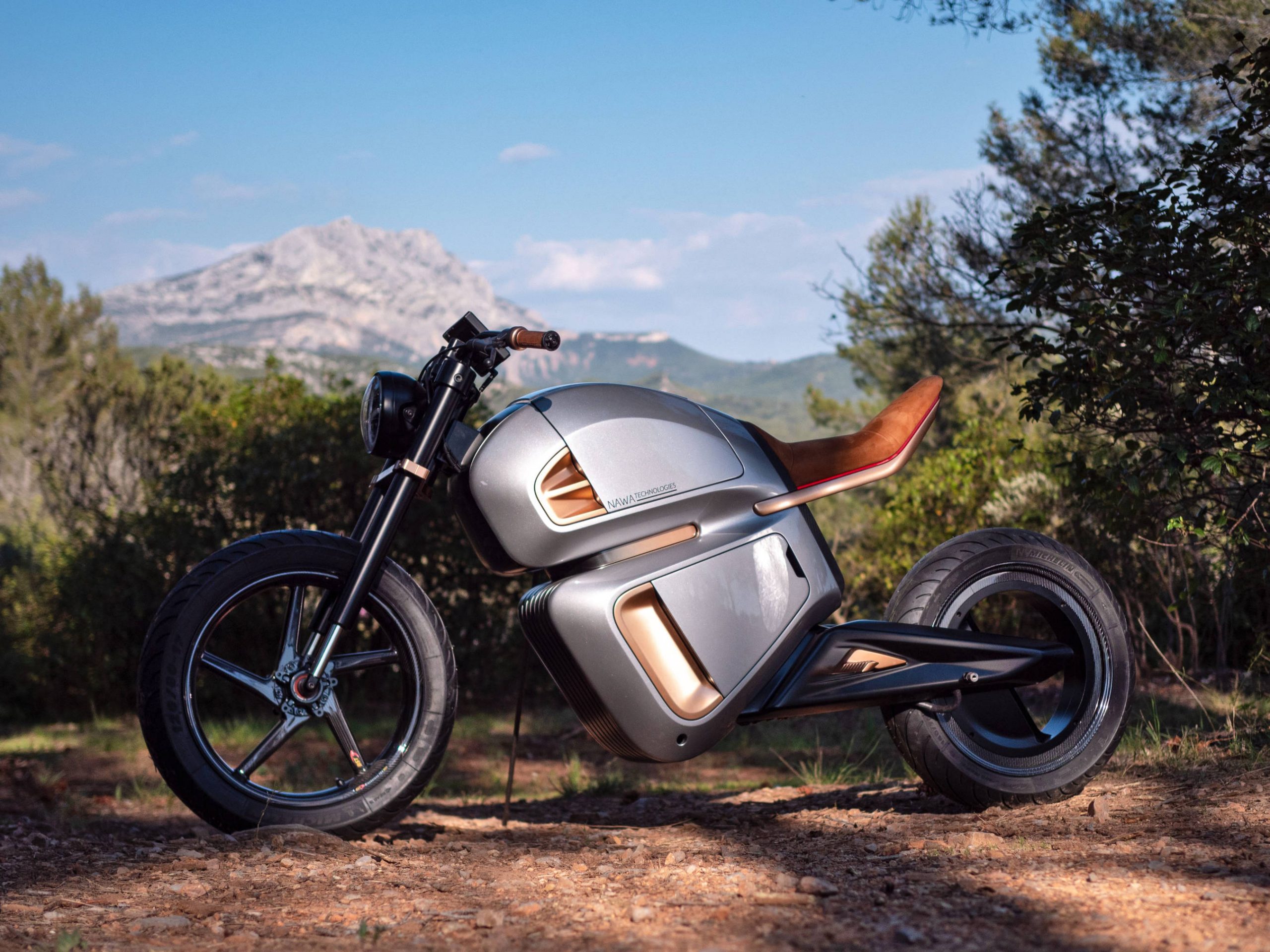

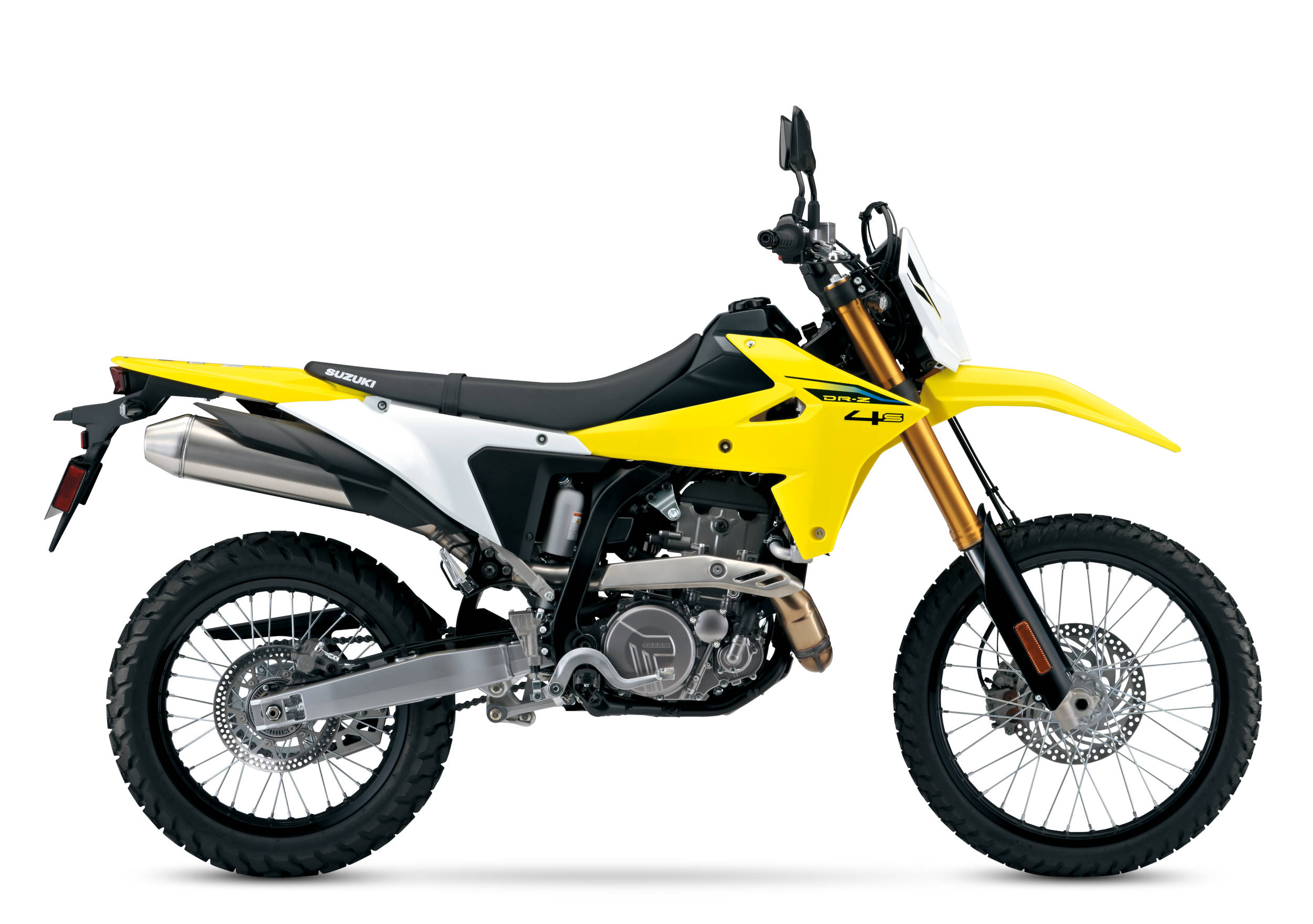
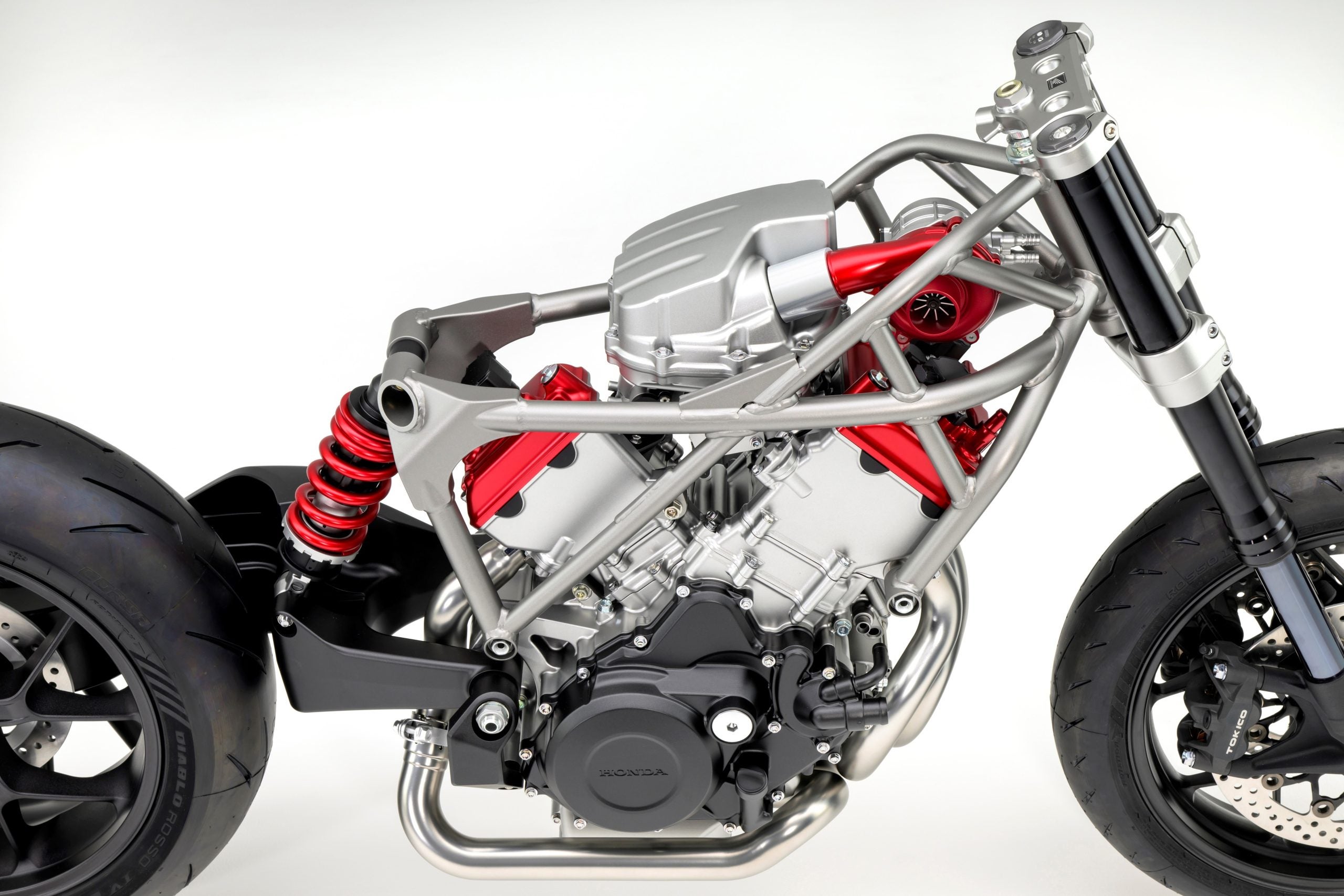
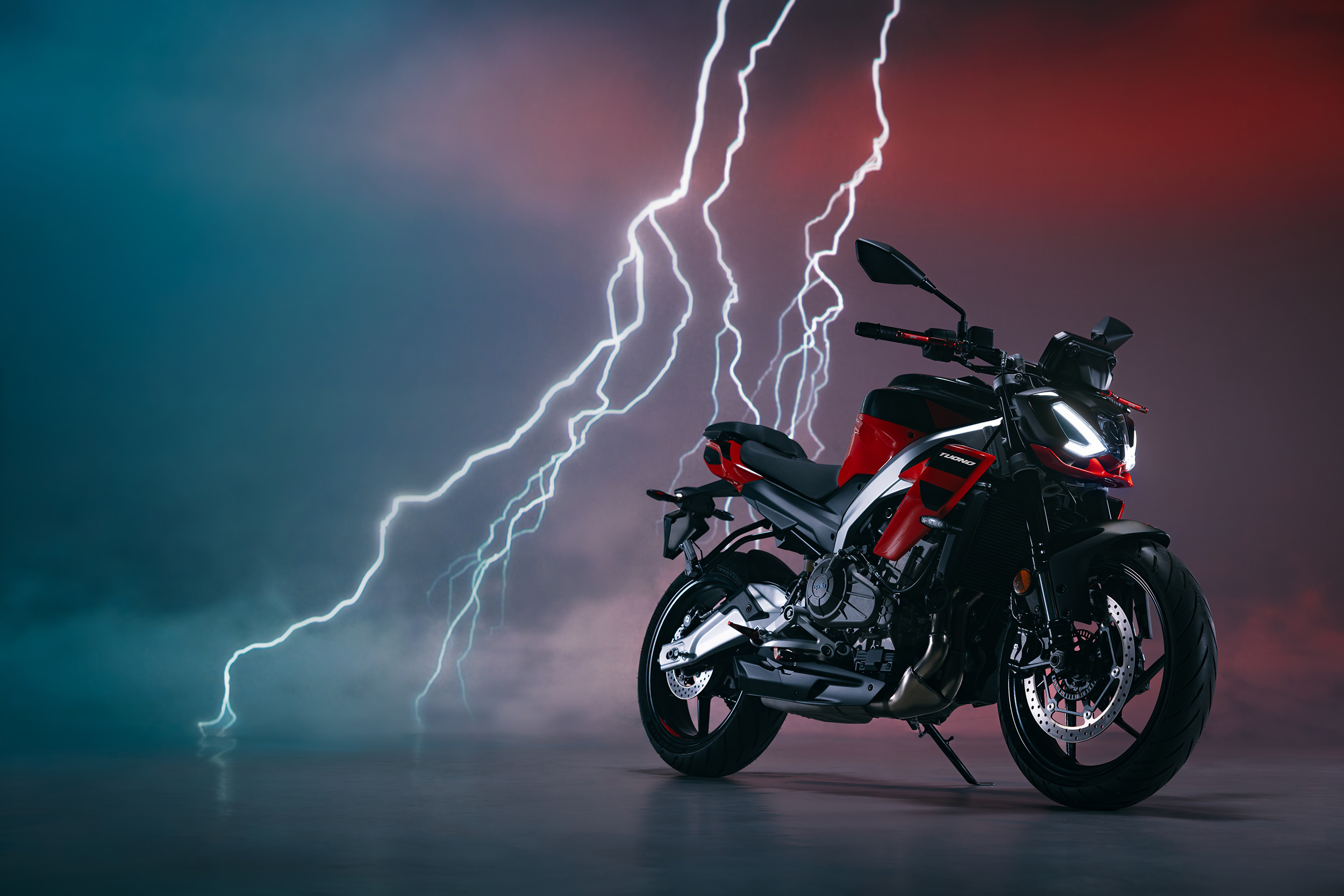
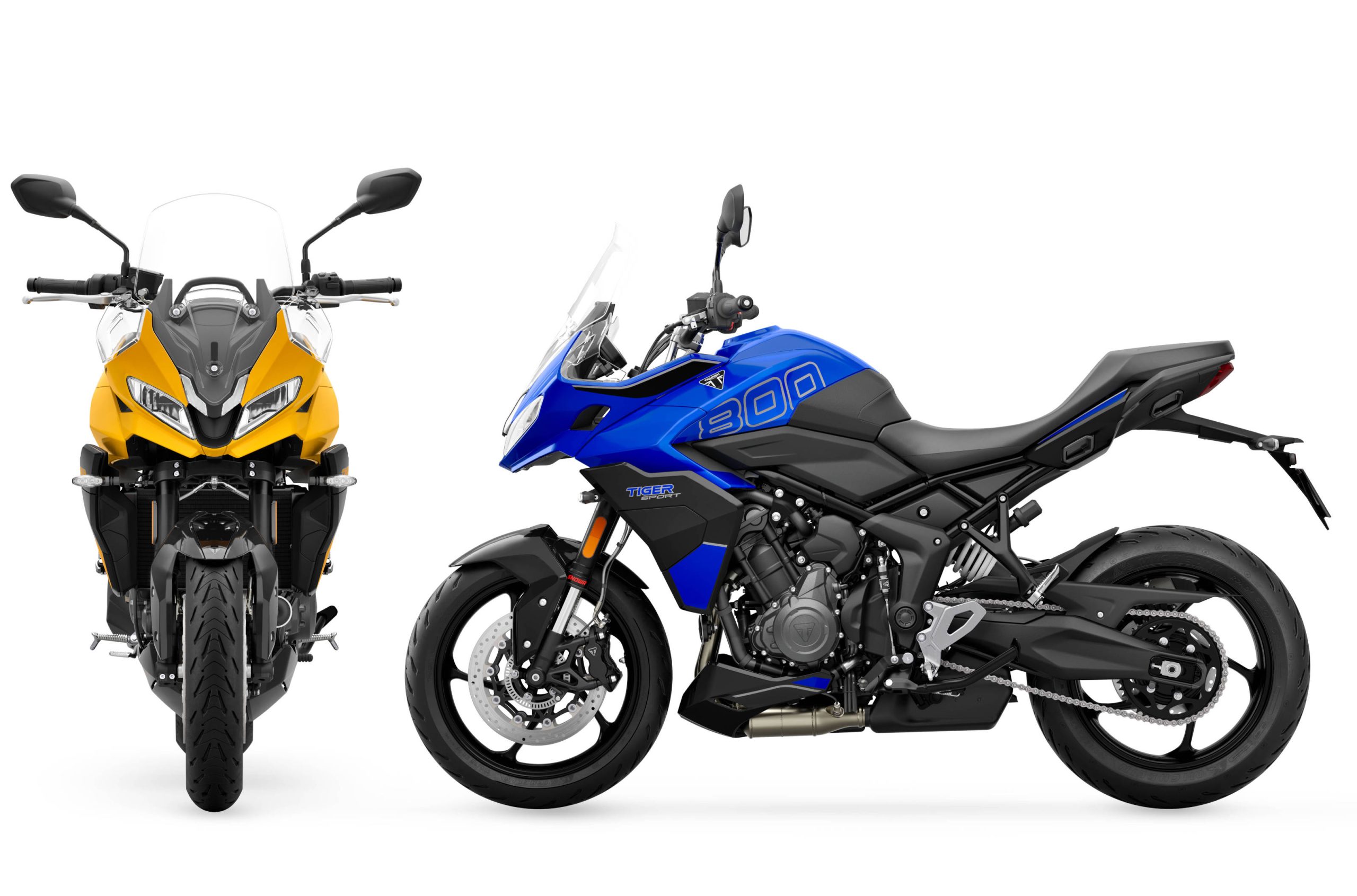
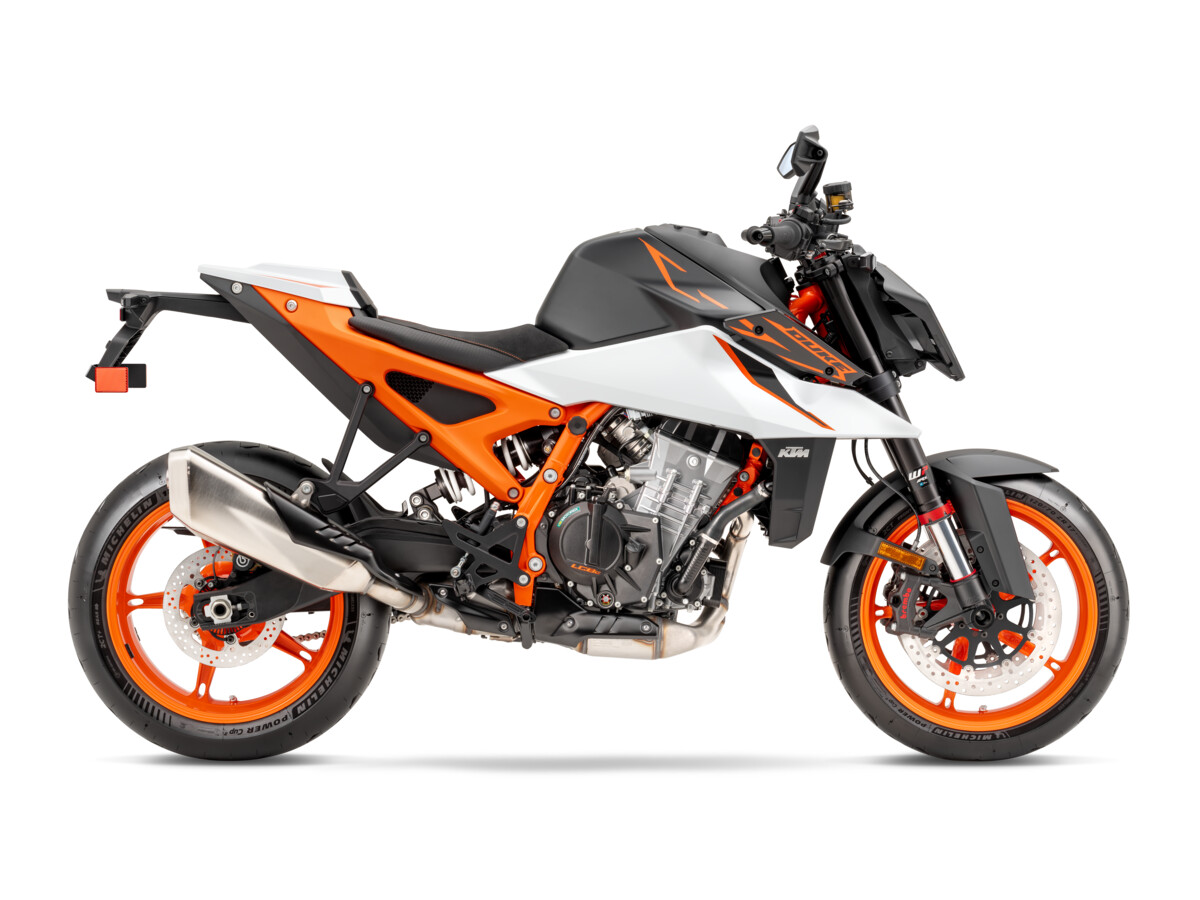
Uh the zero SR/S has a peak range of about 350 km. So what are we gawking at here? And it doesn’t look like something Barney Ruble would have owned.
6.5 inches or go home….. that’s what she said…. about rear tyre width.
Too narrow. Pass.
I love the smell of 2-smoke in the morning, the smell, you know that gasoline smell. Smells like…..victory.
The only way electric bikes would be superior to their ICE counterparts is if they employed two wheel drive. Such a bike would be able to put almost twice the power to the ground overcoming the determining factor that limits current bikes performance and concomitant terminal under-steer.
Such a bike would however, require “fly-by-wire” power steering moving a motorcycle still further away from the ideal; a simple engine in a bicycle frame, AKA a Harley Davidson. Also, it would only be superior for as long as the battery lasts.
the only thing limiting power going to the ground is lifting the front wheel. Once the front wheel leaves the ground under power, acceleration is capped. Having power sent to the front wheel will do nothing to help this – though it will improve regenerative braking.
Todd bad Harley no longer makes singles, twins are already one step away from simplicity.
Through the application of low cost inertial measuring units which already appear on some bikes an efficient torque distribution scheme can be implemented allowing each tyre to achieve its maximum level of grip under any circumstance (i.e. pitch) and therefore optimise the use of power and performance desired by the rider.
The counter steer problem could be eliminated by employing a “funny front end” ala Bimota.
Taken to extremis, a bike with high temperature, super conducting hub motors each about the size of a beer mat employing LH2 as its energy carrier with the ability to distribute the power through almost twice the tyre contact patch of an ICE bike would be transformational. As a high performance bike that is.
Other than that, the only useful application of electric bikes would be in small, local, urban commuter bikes. Every other rationale for them is ideological wokeness. And we know where that leads.
Perhaps I’m thinking about it wrong, but whether the pitch/power delivery is controlled by an IMU or a rider, it is still the limiting factor, no? Ultimately what you need is wheelbase, and that has adverse effects on other aspects of handling.
Regardless, I am not sure a two wheel drive motorcycle would be as revolutionary as you imagine. But I’ve never ridden one, so who’s to say?
This is the same issue cars have too. On first analysis it would seem that the apparent greater pitch a bike has disqualifies them from efforts of all wheel drive but a car is able to exert far great force through its tyres and the greater weight of a car and concomitant inertia combined with almost unlimited power output makes the front tyres lift too. Drag racing is an obvious example where they banned AWD but Audi pioneered 4WD in their ’80’s rally cars.
Traction control has moved on considerably, a 2WD bike with such a scheme would out perform a 1WD bike all day every day and twice on Sundays which has reached it’s limits now.
I don’t think you get the problem. Motorcycles already have too much power, no more can be given to them in order to improve acceleration. Motorcycles are already lifting their front wheel under power so much that controls and limiters are instituted to keep the wheel on the ground – i.e. power is reduced in order to maintain maximum acceleration. Again, no amount of power sent to the front tire will improve acceleration, unless of course the mechanism to provide that power weighs enough to keep the front tire in contact with the ground. Like Jeremy said, a longer wheelbase is the most effective means of reducing lift on a bike, adding mass just fights acceleration. It sounds like you’re thinking of a 10 foot long bike that weighs 700 pounds, not the sort of thing many people would enjoy riding.
I don’t think you get it, perhaps I can’t explain it simply enough.
To reiterate, the limiting constraint on the speed of a motorcycle around a circuit is its terminal over steer – it lifts its front wheel and becomes a mono-cycle when accelerating out of a corner.
Through the application of torque vectoring the front tyre can apply force to the ground in combination with the the rear in such a way as the total – but much higher distribution of power is shared between both tyres.
A more in depth explanation would include the mathematics of the mechanics of such a system which is beyond the scope of this site.
You’re saying that more power would be distributed to the front wheel to reduce the lifting force around the rear axle created by the rear tire, yes? I’m not sure what it would be like on a bike, but the more power applied to the front wheels of a car, the more understeer you experience during acceleration. Without a power steering system, steering also gets really heavy. I wonder if you wouldn’t be trading one limitation for another.
It also seems to me, just from casual observation watching races and riding myself, that the limiting factor in lap times, all else equal, is traction available at the vicinity of full lean rather than a tendency to wheelie. With the front suspension unloading after the apex, any power delivered to that front tire will cause it to slide out immediately until the bike is stood up to a much safer lean angle.
Straightline acceleration in gear ratios that enable the bike to wheelie is the only condition I see where there would be an avantage. But then rear squat devices in GP racing seem pretty effective at keeping the front down and delivering a lot of squirt without the electronics having to intervene once the bikes are standing up straight. I’m not sold on how much if anything you’d gain by adding propulsion to the front wheel.
“ideological wokeness”
Please, define.
In this instance, it is the pretence that we (as a whole) have a desire to replace our ICE bikes with (electric) bikes designed as a result of a political ideology.
As if today’s ICE bikes aren’t fast enough?
Meanwhile in UK.
A motorcycle that you WILL be able to buy that IS’NT visually hostile.
https://www.motorcyclenews.com/news/new-bikes/ccm-maverick/
that pre-dented green tank is like taking a punch to my eye. Looks like it’s using a Husqvarna/SWM engine? I wouldn’t mind having more alternatives available like this.
I don’t understand the complaints about the looks. I think its a nice design. Clean lines, dynamic stance, interesting mix of attractive materials.
proof that there is a key for every lock lol
But would you or anyone buy one???
yes
Will it cost more for the rest of the parts?
As much as I’m a skeptic about electric bikes, let’s be fair. With DC fast charging support, the best e-bikes today can recharge (at least to 80%) in about 45 minutes. Still too long, but not the 4 hours that some people are talking about here.
Which brings up my biggest concern about outside charging stations. Too many incompatible ones across America. Tesla to ZERO and a cluster bunch in between, with all kinds of yuppie ways to pay on your overpriced pocket walkie talkie. Gimmie a gallon o gas Gomer.
Why’s it gotta look like Fred Flintstone is the typical buyer?
These new fandangled flux capacitors also create an invisible force field preventing the tires from picking up and flinging water and road debris!
Rumors that the capacitors have already established a two-state solution in Israel have not been confirmed.
lol who needs fenders on a motorcycle? or mirrors, or turn signals or switchgear?
All a motorcycle needs is a set of handlebars, two wheels and a motor…er power source.
Looks like they forgot the front rotor too.
Put on apehangers and a 26in front wheel and I will put a deposit on now!
Wow, 150 km, that’s 93 miles.
So if I get a late start, I can ride till lunch, then wait 4 hours to recharge, then back home for dinner.
All day and less than 200 miles.
Sounds like a winner.
It will make a good bar hopper…
Should they made it so TREMENDOUSLY UGLY ??
Should they made it so TREMENDOUSLY UGLY ??
Batteries. Super-duper capacitors. This is getting tiresome. Whatever happened to the hydrogen fuel cell? I remember Musk nixing those, so whatever he says goes, I guess.
Nicolaus Otto still reigns supreme. Try different fuels? Hydrous ethanol is flowing in Brazil, but everyone suppresses or lies when quoting the EROEI and energy balance. Brazil claims 8 (no wonder George C. Parker was so successful). Hard to beat what mother nature planted deep in the ground for us, ready to use with a little distillation.
aprilia moto 6.5
With the hideous dialed up to 11.
Absolutely unfounded criticism of a really good and stylish bike that’s a pleasure to ride (the Aprilia, that is). Mind you, if your horizons only extend to a dt-175, I guess it’s understandable…
Appealing technology
HOMELY styling aesthetic !
They better hire a competent designer or NAWA is D.O.A.
Battery technology is an area where many creative minds are working hard. It’s changing so fast and before to long, there will be batteries that will allow many folks to embrace it and learn to enjoy bikes and cars. An example of one such battery is these fast charging aluminum ion ones that for manufacturing are much easier on the environment as well. https://newatlas.com/energy/gmg-graphene-aluminium-ion-battery/
Honestly, I haven’t seen a lot of “fast” change in the battery world for a very long time. It seems like we’re still beating our heads against the same brick walls as 20 years ago. Lots of “game-changing” battery chemistries have created a lot of buzz at the research level, but then you never hear about them again. Lithium ion is one of the few that has made any kind of real impact in the new millennium. And that particular chemistry got its start back in the 1970s, became commercially viable in the 1990s, and has seen incremental improvements since then.
The aluminum batteries you mention have much poorer energy density than lithium. But they can charge faster, so they could certainly play a part in urban mobility. They are at the prototype phase last I read, and would be pricey to manufacture even if they do figure out all the hurdles.
The only real reason we have lithium batteries in cars now is because Chevron bought up the patents on NiMH car batteries and then went around suing all the manufacturers for using that technology. Chevron got $30million out of Toyota so they had to stop production of the Rav4 EV and rethink the prius. A bunch of other companies servicing/rebuilding or manufacturing any sort of vehicle with NiMH batteries were also forced out of existence in the courts.
Maybe if Chevron somehow gets hold of the rights to produce lithium batteries then we will get some other technology. For now, lithium is “good enough” for electric cars and no tiny motorcycle market will force a change to a new technology with better performance.
I’ve certainly heard of the hybrid idea. But I never seen such an idea clothed in such openly hostile styling. There isn’t a square inch of that thing that isn’t physically harmful to look at.
Don’t get close to one. It may try to fall on you and break your leg.
150 km? Followed by, what … a 4-hour recharge cycle? Pass.
So this is what Electrolux is doing.
“Nothing sucks like Electrolux”
The technology is improving at a tremendous rate, there are many companies working on all aspects of electric transportation. I’m sure electric motorcycles will common place within 5 years.
I’m an electrical engineer and the buzzwords they are throwing around are reasonable but all that really matters is the numbers.
“Super Capacitors” are a real thing and are in real products. Garmin Dash Cameras is the first thing that come to mind. Google can splain them better than I but they are basically a different kind of “battery”. Fast charging, fast discharging, more efficient, but much less power density.
It almost sounds Buell-esque when he stored liquids in the frame. These guys big innovation sounds like using the frame volume to serve double duty as structural support and super cap charge storage device.
Innovative but all the matters is the real world results, not the press release claims.
It looks to be a CGI motorcycle – vaporware.
The idea is important, not the cartoon motorcycle. IMO a singular energy source is beyond the realm of functional practicality. Hybrid automobiles, and the newest designs for non recreational aircraft show some improvement in environmental concerns while demonstrating increased motive performance vs energy consumption.
Hub motors are a very limiting issue.
Regenerative braking tickles my fancy, especially recalling cherry red brake discs on racing vehicles, however I don’t use brakes to go anywhere down the road. Helpful, but not gonna fill my tank.
The integration of li battery technology with chubby caps is an engineering exercise of interest to me. GO electrons.
More fake news on the eBike front. It gets more and more boring repeatedly hearing claims about what “amazing” eProducts are “just around the corner”. I suppose it’s just click bait, but it lowers the credibility of the site to keep pushing these vaporware products.
To me this is a very exciting period of incredible creativity with designers going every which way to see what sticks. Reminds me of when snowmobiles first appeared and there were a bunch of manufacturers where only a few survived. One major difference though – electric motorcycles are competing with a very mature (ICE) industry and will have to be really good right from the start.
I’d love to know your definition of ‘fake’.
Did they actually think it was cool to have a 12” diameter rear wheel?
I guess the explanation is that the rim contains the motor and the outside diameter is normal. Whatever, these people must think we are all very gullible!
You know what they say, “The French they are a funny race, they fight with their feet and…”
Well, maybe the engineering concept works but it looks super-geeky.
It Is FRENCH!
They do have a tradition in that area.
(Think Citroen CV2)
Prototype or artist’s conception? I dont see any brakes even though there is a brake lever?
Got to say, either way, that is one unattractive bike imo
Yeah, looks like a general conception piece and not ready for market. But EV’s today can and do incorporate various levels of regenerative braking. Just thinking ahead a little, maybe “Ultracapacitors” are part of that? Increased brake lever movement increases the level of regenerative braking? Hard to see that as the sole source of braking though. Capacitors will charge back up much more quickly than batteries so more of the energy generated from braking is kept.
For some designs, a motor and a generator are the same physical thing. Put electrical energy in and get rotational motion out. Put rotational motion in and get electricity out. So for a regenerative braking system, the motor is effectively a brake.
Traditional brakes turn kinetic energy into (lost) thermal and acoustic energy and wear of braking surfaces. The less traditional brake you see, hopefully the more braking is done regeneratively. In a perfect system, all of your braking would be regenerative motor braking.
Regenerative braking recaptures 80%. The point of racing is to use brakes sparingly. Yet someone is on the right track when they design using many technologies.
Do “Ultracapacitors” result in 1.21 gigawatts?
Only at 88 mph.